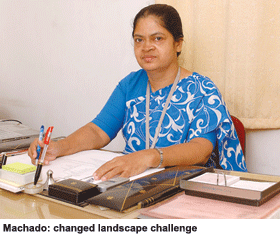With specialisations increasing, job opportunities are aplenty for home science graduates. It has acquired a cool and hip brand image with a substantial inflow of young males into study programmes
Once a staid and old fashioned career for girls from conservative families waiting to get married, home science today has acquired a cool and hip brand image, with a substantial inflow of young males into the profession. Colleges are now offering a widening range of study programmes in this discipline culminating in bachelor’s, Master’s and Ph D degrees, apart from the traditional diploma courses. Modern home science includes food, nutrition and dietetics; human development; textile and fashion technology; and community resources management.
Essentially, home science is a blend of science and art. It draws on many disciplines such as chemistry, physics, physiology, biology, hygiene, economics, rural development, child development, sociology and family relations, community living, art, food, nutrition, clothing, textiles and home management. The subject is largely scientific in nature, and hence requires an analytical and scientific mindset.
The study of home science at the degree and postgrad levels begins after completion of Plus Two preferably with PCB (physics, chemistry and biology) or sociology, psychology and chemistry with an optional subject. The B.Sc home science course offers a common academic programme for the first two years with specialisation in the third year in either food, nutrition and dietetics; human development; textile and fashion technology and community resources management. M.Sc and Ph D programmes in home science are also offered in the same specialisations, viz, food, nutrition and dietetics; human development and textile and fashion technology. Alternatively students have the option of a postgraduate diploma in dietetics and applied nutrition.
Other than these degree and diploma courses, several value-added progra-mmes (nutrition and exercise for fitness, food processing and preservation, visual merchandising, entrepreneurship in textile craft) are offered by the College of Home Science, Nirmala Niketan, Mumbai, one of the premier institutes of home science education in India (estb. 1952), and the only home science college affiliated to the University of Mumbai.
Other reputed institutions offering home science study programmes are Guwahati University; University of Kolkata; Jadavpur University, Kolkata; Ranchi University; Agra University; University of Allahabad; Delhi University; Punjab University; and University of Rajasthan.
With specialisations within home science increasing, job opportunities are aplenty for certified graduates. They are in demand in hospitals as dieticians and diet therapists, as child care counsellors, textile designers, food technologists, interior decorators etc. No longer the archetypal bakes and cakes vocation, contemporary home science graduates are experts in subjects ranging from nutrition to human development, sociology, and community resources management which qualifies them to run crèches and day care centres.
 “Food, nutrition and dietetics is a very popular stream and graduates are snapped up at fancy salaries by major city hospitals, hotels, multinational companies such as Cadburys, Nestle, Kelloggs and even health gyms. With the re-emergence of home science and its widening repertoire, we have started admitting men into postgrad programmes,” says Dr. (Ms) Perpetua Machado, principal of the College of Home Science, Nirmala Niketan, Mumbai.
“Food, nutrition and dietetics is a very popular stream and graduates are snapped up at fancy salaries by major city hospitals, hotels, multinational companies such as Cadburys, Nestle, Kelloggs and even health gyms. With the re-emergence of home science and its widening repertoire, we have started admitting men into postgrad programmes,” says Dr. (Ms) Perpetua Machado, principal of the College of Home Science, Nirmala Niketan, Mumbai.
An alumna of Nirmala Niketan, Dr. Machado graduated from the college’s three-year general home science programme (as it was then called) in 1978. Shortly thereafter, she took a break to pursue religious studies for three years in France as a duly ordained nun of the Congregation of Daughters of the Heart of Mary India. Following her return to India in 1981, she taught home science at the Cultural Academy, Chennai and in Cochin. Picking up the threads of home science education, she enroled for the M.Sc home science programme of Mumbai University in 1989 specialising in food, nutrition and dietetics and started teaching at Nirmala Niketan even as she added to her string of degrees with an M.Phil in food and nutrition, food technology and clinical nutrition from SNDT University, Mumbai in 1997. In 2004, she acquired a doctorate in food and nutrition from Mysore University, and was appointed principal of the College of Home Science (CHS), Nirmala Niketan in 2006.
A recipient of Kellogg’s Young Scientists Award (2004-05) and the Bhara-tiya Shiksha Ratan Award of the Global Society for Health and Educational Growth (2007), Machado has set high standards for CHS. “In keeping with the changing needs of society, we regularly upgrade and expand our syllabus. Recently we have introduced value-added short-term specialist certificate programmes which can be completed together with our degree courses. Our future plans include introducing a postgrad programme in community resources management and ergonomics, an M.Sc course in food processing and technology and sports nutrition. The home science landscape has changed remarkably and Nirmala Niketan is in the vanguard of this change process,” says Machado.
Right on Sister!
Indra Gidwani (Mumbai)